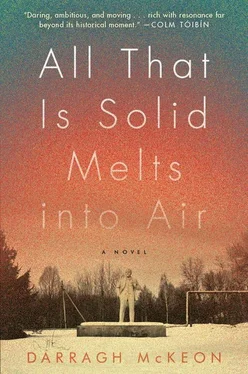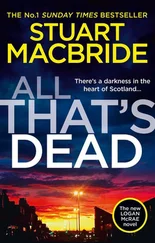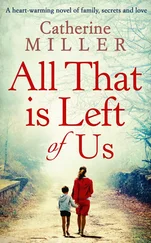Maria and Alina grew up in Togliatti, an industrial town in the Samara region, in an apartment similar to the one in which they live now. Her father worked the ticket booth in the train station, playing chess round the clock with a small cadre of friends who would drop by at appointed times. As she got older, she realized that when her father was referred to by people outside the family it was in a hushed, strained, maybe sour, way. Stray comments leaked through the cracks of winter-planed doors. People cast glances over downturned shoulders. She was exposed to it from the earliest age, and it took some time to realize—by watching how the same adults treated her few childhood friends—that this was not the norm.
He disappeared one day, a few months short of her twentieth birthday. It was Alina who finally told her that the notebook their father kept in his small booth didn’t contain records of chess matches but a detailed account of the movements of the city. Who went where and when. Who bought what, talked to whom. What someone wore on a particular day, who they welcomed off the platform. Their father was the gatekeeper for the town, the all-seeing eye, passing the information along a chain of connections, resulting in actions which Maria couldn’t help imagining.
Then he too disappeared, and this was something they couldn’t account for. There were no answers to this development. A Saturday afternoon when he went to the hippodrome to lay a little money on the horses and never returned. They questioned everyone. Everyone they asked gave no reply. She accompanied her mother to the buildings of the men he played chess with, and they stood at their doors while a mother and wife broke down under the gaze of her daughters, physically knelt before these men, wrapping her arms around their legs in an action of abject desperation, and they looked into the middistance, viewing the ordinary motions of their street, her wretched family oblivious to them.
Alina is ironing shirts. Alina is always ironing.
“Now he’s having trouble with his maths.”
“I know, I gave him some help.”
“First his timing goes. Now the little genius can’t even count.”
“You can’t worry it away. It’s not like one of your creases.”
“Oh, and he’s your child. You’re right, of course. The past nine years I’ve been thinking he’s mine.”
“Be sarcastic. I’m trying to be supportive.”
“The kid doesn’t even listen to me, he listens to you. Since when did I become the enemy?”
“He doesn’t want to disappoint you. Just give him some time.”
Maria folds some shirts. Alina sprays water from a plastic bottle and runs the iron over the damp patches, and steam expands into the room.
It’s time for a drink.
It’s a thing that has sneaked into her life: a drink or two and the evening counts its own way to its conclusion. And she’s not ashamed. It’s a fringe benefit of manual labour, no one questions your need to unwind. She stands on the balcony, glass in hand, with a clear bottle, its white label inscribed with one word in large black type: VODKA. There is a pleasure, she finds, in its unadorned seriousness. The stark quality of the label eliminates the trivial drinker.
This is Maria’s moment of quiet reflection.
What are my ambitions?
Sometimes she thinks into the middle of her unborn child’s life. It’s not a ghost that follows her around, she doesn’t look at other kids and wonder what colour its eyes would be or if it would have difficulty tying its laces. But she sees imagined scenes. A daughter being fitted for a dress. Sitting for dinner in the apartment of a bright young couple, proud and radiant, though she doesn’t know if her child is the man or the woman. Odd, imagined moments. Snatches of an alternative life.
When she had the procedure—as they kept referring to it—she didn’t tell him beforehand. He is a doctor, he spends his life healing, repairing—there was no way he would allow her to go through with it. Instead she left a note in his jacket pocket. Just the facts, the decision, no pleading for understanding, no fleshing out of her thoughts.
Afterwards, when she had had a few hours’ rest, she took a taxi home, bleeding and weak, and when she opened the door she saw him sitting on a wicker stool beside the stove. He held the note towards her, the scrawled lines she’d left to explain herself. Even in her weakened state she knew it was now a piece of evidence, and he held it up, not needing to voice the question, his eyes asking it for him: Who are you?
Of course, their marriage couldn’t survive such a thing. That too was a calculation on her part. It was not only her actions that would hurt him, it was the independent nature of them, demolishing the closeness that had grown between them. Grigory is a man who listens, who speaks directly to the centre of things. This is why she fell in love with him. At parties he would stand in the corner and, inevitably, people would divulge their lives to him. Teary-eyed women returning from their conversations with him would clasp her forearm as they passed, making eye contact, thanking her, acknowledging her luck in finding such a partner, and her impulse would be to smash her glass into their teeth.
Sometimes, after work, she would visit him in the hospital, and he would be mid-surgery and she could look through the viewing window and watch the refined world in which he functioned, the ghostly lights and bodywear, the goggles and instruments, the small, highly skilled gathering focused upon a single point. She would stand beside the family of the patient as they held hands and wept, mumbling prayers under their breath, watching what she was watching, their loved one at the mercy of her loved one, and sometimes, from a distance, she would observe him—unaware of her presence—speaking to the families in his white coat, and they would kiss his hand or fold into despair depending on his words, and how could she come home, after witnessing all this, and ask him to take on her worries? How could she do this when she wouldn’t even allow herself to be irritated when he left empty containers in the fridge or stubble in the bathroom sink?
In their final weeks, they spoke to each other only through functions: “Can you pick up some milk?”; “The lightbulb in the bedroom needs changing”; “Are there any clean towels?” There were times she felt close to him, reminded of what she once had, when a tremor of their intimacy would stir her into recognition. The scent of him. Or when he reached past her or stood near her, the disparity in their size, the natural protection he offered. In these times she wanted to reach out, place a hand on him, say a vulnerable word, knowing this was an impulse he shared. But they couldn’t bridge that void, articulate what they needed to articulate. Their language had been unlearned, and it had become too painful now to recall.
Now Maria has a folding bed that they keep behind the couch. Maria has two pairs of shoes, one of these so worn that water seeps through, and so they are only halfway practical for six months of the year. Maria has one pair of earrings and underwear so greyed it looks, and feels, as if it has been fashioned out of concrete. She has a faltering nephew and a long-suffering sister. She has a duty to them.
She doesn’t have ambitions anymore, she has responsibilities.
She flicks matches over the railing. They spit hot flame and twirl calmly to the ground, end over end, disappearing from sight after four floors. She’ll run out of matches and look up, turn around, walk into the kitchen, and ten years will have elapsed. Already she’s surrounded by the past. It seeps into every moment. Like the smallest things that remind her of her father. Someone cracking an egg. Someone sweeping snow from the bottom of their trousers. In the subsequent years there were no letters or postcards, no word sent back about him, and this leads her to believe that whatever happened had happened quickly. If he was locked away somewhere, they would eventually have heard about it. So there was no prison. They didn’t even know if it was the KGB or someone whom her father had informed upon, some family whose lives he had ruined.
Читать дальше












